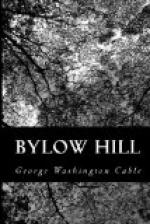Leonard Byington, esquire:
Sir,—I find myself compelled to ask that you consider your acquaintanceship with my wife at an end. Doubtless this request will give you more relief than surprise. The visible waste of your frame and the loss of her exquisite bloom are proof enough that both you and she have long been in daily dread of a far worse visitation. It is not worse, because I know how sentimental your impotent and conscience-plagued interchanges of affection have been. I shall permit and assist you to keep this matter a secret. To let it be known would instantly wreck your own career, and would blast at a breath the fortunes of our church and of every one of both our kindreds. I will therefore not at this time require you to resign your church office or to break off those business intimacies with me which, though no longer founded in personal esteem, are vital to interests that common decency must move you to shield from new peril.
I ask for no repair of the inextinguishable wrong you have done me. I only ask you not to fancy that I am to be beguiled by arguments or denials or moved by threats, or that one word I here write is founded on conjecture or inference. Grovelling at my feet, in sobs of shame and with prayers for pardon, Isabel has told me all. Has told me all, Leonard Byington, my once trusted friend. Now, though prostrated on her bed, she rejoices in the double forgiveness of her husband and her priest, blessing him for deliverance from the misleadings of one who—great God! must I write it?—might at last have dragged her into crime. It is her request, as it is my command, that you darken our threshold no more, and that as far as practicable you keep yourself from her sight.
Faithfully,
Arthur Winslow.
With his swivel-chair overturned behind him the young lawyer stood at the desk of his inner office, read this letter through at headlong speed, turned it again, and re-read it slowly, searchingly, from his own name to its writer’s.
Then readjusting his chair he stepped to a door, asked a clerk in the outer office to order his cutter, turned back, and was closing his desk, when his partner came to him.
“Byington, are you ill?” asked the fatherly man.
“No; I’m only going out on some business. I’ll be back about—” He looked at his watch.
“Byington, don’t go. You’re ill. You don’t realize how ill you are. If you go at all, go home, and let me send some one with you. Why, your hand is as cold”—
“I’m all right,” said the young man, freeing his hand and smiling with white lips. He took his hat and passed out.
Meanwhile Isabel lay on her bed too overwhelmed to rise. In his room adjoining, with doors locked, Arthur paced the floor. He had spent the first half of the night in an agonizing interview with his wife, and the second half in writing and rewriting the letter to Leonard.




